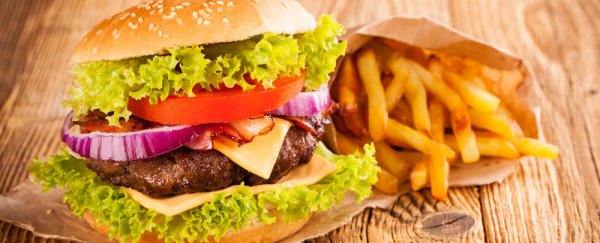When you're feeling the burn after an intense workout, it may not be such an outrageous idea to grab burger and fries instead of a sports drink, a new study suggests - so long as you limit yourself to a small serving.
Researchers from the University of Montana in the US have found that fast food, in small doses, can be just as effective as sports supplements, when it comes to encouraging muscle recovery and restoring depleted nutrients after intense cardio sessions.
The results, which were published in the International Journal of Sport Nutrition and Exercise Metabolism, highlight the fact that post-workout supplements, such as Gatorade and energy bars, might be over-hyped in terms of the recovery benefits they offer athletes.
"Our results show that eating fast food - in the right amounts - can provide the same potential for muscle glycogen as sports nutrition products that usually cost more," said exercise physiologist and co-author, Brent Ruby, in a press release.
In the study, 11 male cyclists - who were reasonably fit but not elite athletes - completed a challenging 90-minute ride on a stationary bike, followed by a four-hour rest period. During the rest period, the participants were given either fast food, including burgers, fries, hash browns or soft drinks, or a combination of sports supplements, such as Gatorade, or energy bars.
The cycling exercise was designed to deplete the participants' levels of glycogen - a complex carbohdydrate responsible for storing energy in our muscles - which they could then replenish by what they ate and drank in the post-workout recovery session.
Importantly, the after-workout meals given to the participants all had about the same nutritional content - roughly 70 percent carbohydrates, 10 percent protein and 10 percent fat, writes Zach Wener-Fligner at Quartz.
After this rest and snack period, the athletes were then asked to ride a 20 km time-trial on the bike, to test the effects of the diets on their performance. Between the 90-minute ride and the time-trial, the researchers took and analysed muscle biopsies from the riders' quadriceps and blood samples at 30 minute intervals.
Each of the 11 cyclists performed the experiment twice, separated by a week, eating the fast food for one set of rides, and the supplements for the other set.
In the end, the researchers found that it didn't really matter whether the subjects consumed fast food or supplements. They found no difference in blood glucose and insulin responses, or glycogen restoration rates, which relates to how well muscles are recovering. And most importantly, they say, there were no differences in the time-trial speeds between diets.
Still, the authors have stressed that their research is not intended to promote fast food as a healthy option.
"We had participants eating small servings of the fast-food products, not giant orders of burgers and fries. Moderation is the key to the results we got," Ruby said.
In an email to Quartz, Ruby further emphasised that the study was done with subjects who were in relatively good shape who exercised routinely.
"These results do not apply to unfit or overweight people - that is a very important point,"he explained to Quartz.
That salt-rich foods, such as hamburgers and fries, might be good post-workout chow might not be that surprising, as athletes tend to lose a lot of sodium when they sweat.
Next time I go for a run, I might take a small detour.
Source: Quartz
